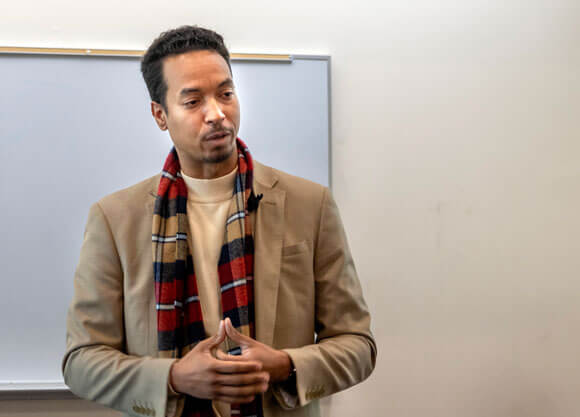
Building trust: A Critical Conversation on 'The Art of Democratic Discourse in 2024'
March 27, 2024

March 27, 2024

The series seeks to cultivate an inclusive and intellectually stimulating environment at Quinnipiac, fostering inclusivity of thought, respectful dialogue, empathic engagement and open-mindedness among students, faculty and staff.
Wood thanked the Quinnipiac community for a warm welcome and for the opportunity to speak at a time when there seems to be much agreement across the country about the current state of divisiveness in America.
“The question is: How do we restore our culture of trust and goodwill in America’s democracy, sufficient to allow us to overcome the depth of the issues and the rifts that divide us in our politics, our culture and our society?” Wood said.
Wood is a national ambassador for Braver Angels, the country’s largest grassroots, bipartisan organization dedicated to political depolarization. In his work with Braver Angels, Wood is a member of the Progress Network, an initiative of the New America Foundation dedicated to fostering civilizational progress through thought leadership across a wide spectrum of views; a field builder with New Pluralists, a collaborative of organizations dedicated to civic bridge-building and racial justice; and an advisor with the American Project: an initiative of the Pepperdine School of Public Policy dedicated to restoring the communitarian roots of conservatism.
In 2014, as California’s youngest active nominee for Congress, Wood challenged Maxine Waters in California’s 43rd district, running for office as a unique Republican with a unifying campaign. Following his campaign, Wood was elected as Second Vice-Chairman of the Republican Party of Los Angeles, the largest Republican county party in America.
Today, Americans are deeply mired in “affective polarization” — contempt for one another on the basis of differing political opinions and political identities. It’s an untenable position for a self-governing free society, said Wood.
This affective polarization has been fueled by perverse incentives of specialized media and social media outlets that cater to ideologies in return for ratings and clicks; technological advancements that have brought unforeseen consequences to the body politic; and the demographic evolution of America, he said.
However, Wood said, post-civil rights movement and post-1960s, the United States was always going to experience natural difficulties as a consequence of a diversified body politic, even without the reality of bad business incentives and the advent of social media.
“That was going to be an issue — that was going to be a challenge, regardless of whether we had a 24-hour news cycle, regardless of whether or not social media would wind up evolving the way it did,” Wood said. “These natural demographic challenges in American life are compounded by perverse incentives, by unforeseen consequences of the evolution of technology in a way that delivers us to a moment where American democracy and stability of its institutions feels weaker than it has been for many Americans in a very long time.”
Wood said he believed the change that’s required can begin by implementing a civil society-based strategy for cultural and institutional intervention.
“It does require the active body of Americans from across the political spectrum in a way that organizes us irrespective of party affiliation, in ways that allow us to depolarize,” said Wood. “What that really means is to build relationships of some minimum goodwill, trust and understanding across the political divide and really across this identity divide, in the context of our institutions and our prevailing narrative for how we talk about American political life. This is the business model strategy of Braver Angels.”
Among many efforts, Braver Angels has piloted conversations with those of differing views to build interpersonal trust through the sharing of personal, lived experiences which have shaped their political and American identities.
“We humanize each other as people, as fellow Americans, before diving into the nitty gritty of the policy debates and arguments. And when we did that, we found that we created the space, through trust, for reason to emerge,” said Wood. “It shows what’s possible when the basic paradigm of distrust in our democratic politics is challenged in a more moral way.”
Wood closed the conversation with his thoughts on Dr. Martin Luther King Jr.’s philosophy of non-violence. Wood shared Dr. King’s words that, “…in a nonviolent movement, we seek not to defeat the enemy, not to humiliate the white man, but to win his understanding and his friendship; to communicate to him that peace and justice, not for ourselves alone, but for him also, so that we may be reconciled to one another in the beloved community.”
This concept of spiritual liberation of all people, whether the oppressed or the oppressors, is a powerful principle, said Wood.
“I believe that basic moral spiritual perspective still has power today if only we can remember it. If only we could allow ourselves to embrace and re-embrace vocabulary and our full imagination of love, of agape love, of goodwill; and a desire to transform our social and political relationships in a way that reignites the spirit of trust between the very different peoples of American society,” Wood said. “We’re all Americans, we are all human beings and we all want to feel like we belong in this country…but we can’t truly feel like we belong to this country if we do not also belong to each other. And so that, to my mind, is the goal.”
Quinnipiac Today is your source for what's happening throughout #BobcatNation. Sign up for our weekly email newsletter to be among the first to know about news, events and members of our Bobcat family who are making a positive difference in our world.
Sign Up Now